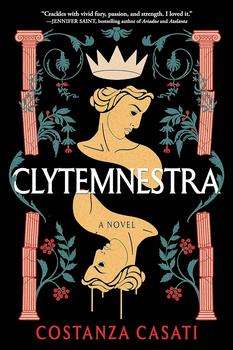Page 3 of 3
There are currently 18 member reviews
for Clytemnestra
-
Roberta W. (Los Ranchos, NM)
The Notorious Clytemnestra
It would be hard not to write a good book based on the myth of Clytemnestra and this book definitely delivers. All the themes are there---love, lust, jealousy, vengeance and murder. This book tells the myth from the perspective of Clytemnestra. The author begins with Clytemnestra's childhood and we learn much about her siblings and how Clytemnestra protects them, especially her sister Helen (of Troy).
Clytemnestra falls in love with and marries Tantalus and they have a child. Clytemnestra is happy and joyful, but this all changes when her father, Tyndarus schemes with Agamemnon and Menaleus resulting in Agamemnon murdering Tantalus and the child. Clytemnestra is then forced to marry Agamemnon. Thereafter Clytemnestra is angry and thinks only of revenge. Agamemnon and Clytemnestra have children, but when Agamemnon sets off for Troy, he gets stuck in the harbor because there was no wind. He then sacrifices their daughter Iphigenia to appease Artemis and by the time Clytemnestra learns of this, her daughter is dead and Agamemnon has set sail. Once Agamemnon returns, Clytemnestra carries out her revenge.
Casati creates a sympathetic character who is fierce and bold. Simply put Clytemnestra is a badass.
I think the book could have used more editing. Some of the transitions between chapters were clumsy and overall the book could have been tighter. But the writing is wonderful.
I enjoyed the book and recommend it.
-
Carla A
Clytemnestra will be remembered
Clytemnestra is a tale of a sister of the infamous Helen of Troy. The book set in Ancient Greece is a gripping, page-turning story of her life from young princess to brave queen in such barbaric times. The characters were well developed as well as their relationships with each other. History may say otherwise but Clytemnestra was a courageous woman, a loving and protective mother, and a fearless leader. There is a lot of life lived in these pages. I highly recommend this book and I plan to share this book with my book club in 2023.
-
Vicky R. (Roswell, GA)
Clytemnestra the Queen
4.5 STARS ..I am a huge fan of Greek Mythology...this book was a winner for me. Not knowing as much about Clytemnestra as her sister, Helen, I devoured this information on a Queen who has a past reputation as being evil. She was a devoted mother to her children and guarded them with her life. As with everything Mythological, the book has grit, greed, war, grief and a disrespect of life...but I loved reading about this particular family. Author did a great job of bringing these characters to life.
-
Patricia C. (Naples, FL)
A Fascinating Woman from Mythology
The author has managed to give us a fascinating portrait of a woman who in Greek mythology was known only as a revengeful queen. However, Clytemnestra was so much more. She is in fact a very complex figure according to the novel's author. She is strong, intelligent, caring for her family and especially her children and siblings.
Using as some of her sources, Homer, Aeschylus and Euripedes, Casati has introduced us in a very contemporary style of not only of who Clytemnestra was, but also gives us a very human picture of the mythological heroes of Ancient Greece. We see Helen not only as the beautiful face "that launched 1000 ships," but also as a bright and sensitive woman; we learn about the violent and cruel man who was Agamemnon; we see Penelope not just as the patient wife of Odysseus but as a bright and resolute woman. They were all real people in the novel, not just mythological heroes.
But the star of this novel is Clytemnestra! She is practically in every page. I was impressed by her intelligence and her strength. She was rare among ancient Greek women probably because she was from Sparta whose culture worshipped strength both mental and physical in both men and women. When she was forced to be queen of a different city state, she had to use both her mental and physical strength to not just survive but to rule. Her pain at the loss of her daughter Iphigenia was one act that she could not ignore. She felt her daughter was killed "for a puff of wind." And that is when the revengeful part of her personality emerges and remains the image the ancients had of her
Clytemnestra was a woman who had seen two of her children killed --one by her father and one by her husband. She had seen her beloved first husband killed by her father, the sister she had loved and protected was characterized as a whore.
She felt revenge was her only option even though she knew of the consequences.
I recommend this book. It is written well and should provide interesting discussion.
